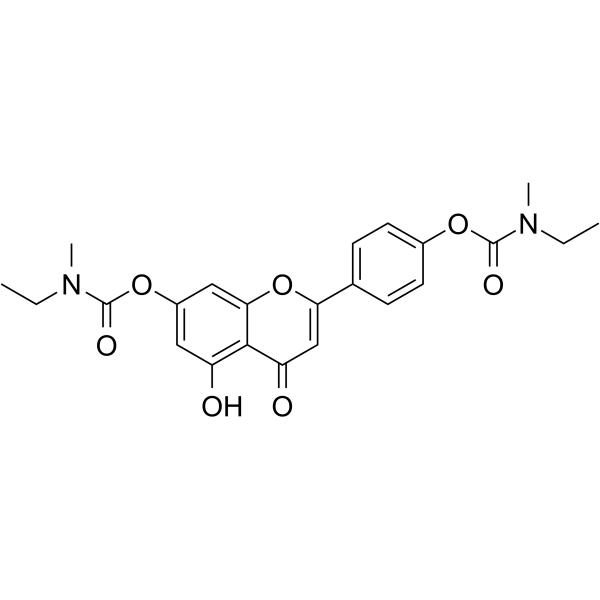| Description |
AChE-IN-15 (Compound 3d) is a reversible human acetylcholinesterase (huAChE) (IC50=6.8 μM) and human butyrylcholinesterase (huBChE) (IC50=16.1 μM) inhibitor. AChE-IN-15 shows significant antioxidant potency, AChE-IN-15 can be used for the research of Alzheimer’s disease[1].
|
| Related Catalog |
|
| In Vitro |
AChE-IN-15 (compound 3d) inhibits huAChE and huBChE with IC50 values of 6.8 and 16.1 μM and inhibits RatAChE and RatBChE with IC50 values of 4.7 and 12.1μM[1]. AChE-IN-15 (compound 3d) (25 μM) inhibits self-mediated aggregation (77.9), huAChE-induced Aβ1-42 aggregation (73.6%), inhibit (78.9%) and disaggregate (64.6%) Cu2+-mediated Cu2+-mediated aggregation[1]. AChE-IN-15 (compound 3d) (25 μM) is an neuroprotective agent and displays hepatoprotective activity[1]. AChE-IN-15 (compound 3d) (25 μM) shows good blood-brain barrier (BBB) penetration[1]. AChE-IN-15 (compound 3d) (5-10 μM) displays neuroprotective effect on Aβ1-42-induced SH-SY5Y neurotoxicity[1]. Cell Cytotoxicity Assay[1] Cell Line: PC12 cells Concentration: 5 and 10 μM Incubation Time: 24 hours Result: Increased the cell viability to 63.9% (5 μM) and 72.3% (10 μM), respectively.
|
| In Vivo |
AChE-IN-15 (compound 3d) (5-20 mg/kg; 14 days; Kunming mice) can reverse cognitive deficit. Animal Model: Kunming mice[1] Dosage: 5, 10 and 20 mg/kg Administration: for 14 days Result: Reversed cognitive deficit induced by scopolamine.
|
| References |
[1]. Zhipei Sang, et al. Apigenin-rivastigmine hybrids as multi-target-directed liagnds for the treatment of Alzheimer's disease. Eur J Med Chem. 2020 Feb 1;187:111958.
|
